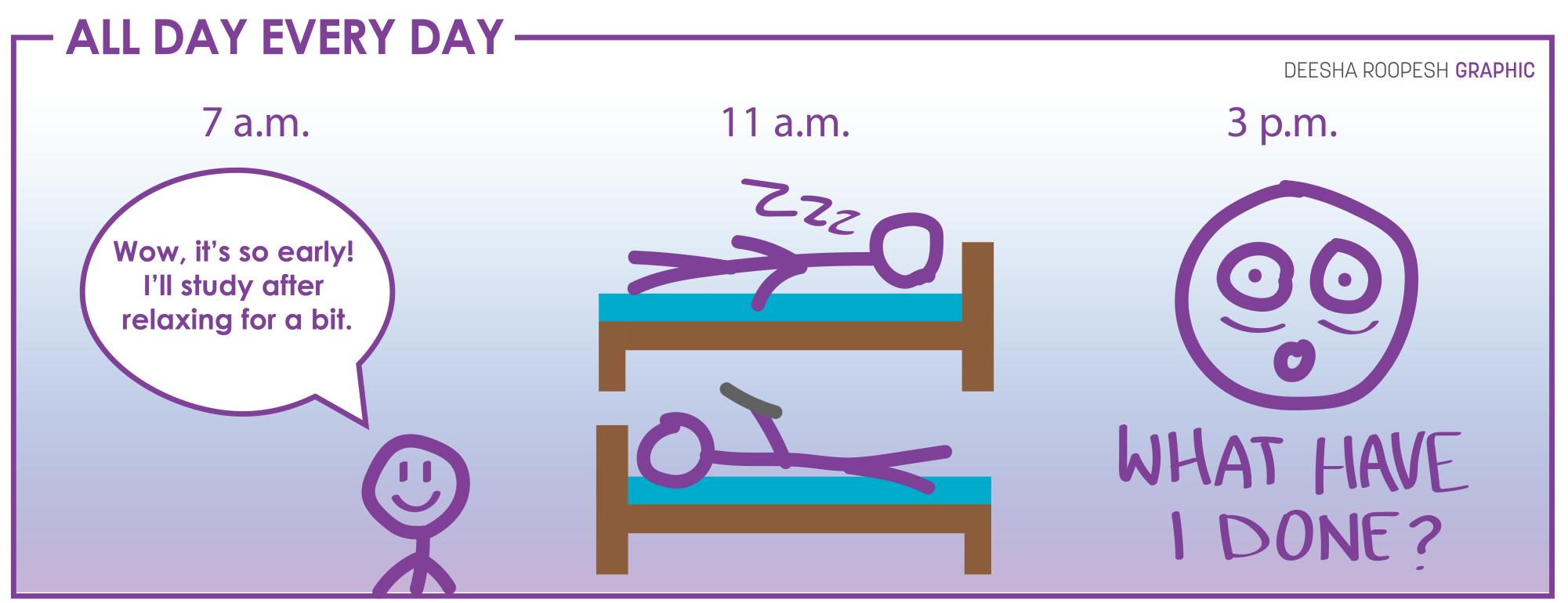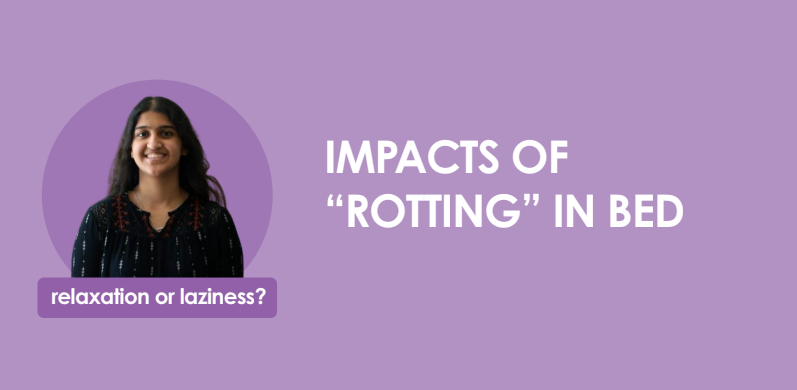The term “bed rotting” paints a pretty distasteful picture. According to Health.com, the term refers to a TikTok trend that involves lounging in bed for extended periods of time, engaging in activities such as scrolling online, watching TV and snacking. The article states that Gen Z in particular seems to partake in “rotting” activities due to burnout.
The videos I’ve seen on TikTok vary in intensity of rotting. Some people choose to rot for a few hours while others rot for days. There are many strong opinions on the subject. Some of the videos I’ve seen praise bed rotting as a way to recharge from the stresses of everyday life and a form of self-care. To that end, I’ve seen people incorporate other forms of self-care into bed rotting, such as skincare and journaling. Other videos criticize bed rotting, stating that it’s disgusting and lazy, but according to Dr. Nicole Hollingshead, in a society that glorifies constant productivity, it can be beneficial to treat burnout by scheduling a time to relax, or “rot”.
The answer is somewhere in the middle: rotting can be good but it should have limits. On one hand, school can be really overwhelming if I don’t take a step back. Sometimes that includes reading a book in the middle of the week or going for a walk. But other times, all I want to do is watch mindless television in bed. Personally, I try to not eat in bed because of ants and bugs, but I can see the appeal for others to snack. I usually plan lazy days on Saturdays so after a day of rest, I get back to work. This prevents schoolwork from piling up, which would just cause more stress and work.

On the other hand, excessive rotting can have negative consequences on both mental and physical health. According to Lynn Bufka, associate executive director for practice research and policy at the American Psychological Association (APA), people suffering from depression might see bed rotting as a way to withdraw socially and isolate themselves. Bufka also said people with anxiety might use bed rotting as a tactic to avoid stressors. It’s better in the long term to practice methods of how to deal with stressors rather than outright avoiding them. While bed rotting can seem extremely appealing, there are other forms of self-care such as meditation, yoga, journaling, therapy and exercise that can be healthier ways to manage mental health.
In addition, for physical health, bed rotting is not conducive to an active lifestyle. According to Dr. Dianne Augelli, bed rotting can disrupt sleep patterns. By using your bed for activities other than sleeping, it’s more difficult to initiate sleep when the time comes. Augelli suggests rotting in a place other than your bed, such as a couch or another room. Although my bed is usually my ideal spot to lounge, I try to keep my bed rotting behaviors out of my room.
Some might see “bed rotting” as lazy and unproductive, which is partially true. But if the point of bed rotting is to relax, lounge and spend time doing things you enjoy, those effects can be prevented by practicing bed rotting in moderation. Personally, I see “bed rotting” as a form of self-care. It allows me to take a breather from my to-do list and spend time doing things that I enjoy.
The views in this column do not necessarily reflect the views of the HiLite staff. Reach Salima Sher at ssher@hilite.org.
















































































![Review: “The Immortal Soul Salvage Yard:” A criminally underrated poetry collection [MUSE]](https://hilite.org/wp-content/uploads/2025/03/71cju6TvqmL._AC_UF10001000_QL80_.jpg)
![Review: "Dog Man" is Unapologetically Chaotic [MUSE]](https://hilite.org/wp-content/uploads/2025/03/dogman-1200x700.jpg)
![Review: "Ne Zha 2": The WeChat family reunion I didn’t know I needed [MUSE]](https://hilite.org/wp-content/uploads/2025/03/unnamed-4.png)
![Review in Print: Maripaz Villar brings a delightfully unique style to the world of WEBTOON [MUSE]](https://hilite.org/wp-content/uploads/2023/12/maripazcover-1200x960.jpg)
![Review: “The Sword of Kaigen” is a masterpiece [MUSE]](https://hilite.org/wp-content/uploads/2023/11/Screenshot-2023-11-26-201051.png)
![Review: Gateron Oil Kings, great linear switches, okay price [MUSE]](https://hilite.org/wp-content/uploads/2023/11/Screenshot-2023-11-26-200553.png)
![Review: “A Haunting in Venice” is a significant improvement from other Agatha Christie adaptations [MUSE]](https://hilite.org/wp-content/uploads/2023/11/e7ee2938a6d422669771bce6d8088521.jpg)
![Review: A Thanksgiving story from elementary school, still just as interesting [MUSE]](https://hilite.org/wp-content/uploads/2023/11/Screenshot-2023-11-26-195514-987x1200.png)
![Review: "When I Fly Towards You", cute, uplifting youth drama [MUSE]](https://hilite.org/wp-content/uploads/2023/09/When-I-Fly-Towards-You-Chinese-drama.png)
![Postcards from Muse: Hawaii Travel Diary [MUSE]](https://hilite.org/wp-content/uploads/2023/09/My-project-1-1200x1200.jpg)
![Review: "Ladybug & Cat Noir: The Movie," departure from original show [MUSE]](https://hilite.org/wp-content/uploads/2023/09/Ladybug__Cat_Noir_-_The_Movie_poster.jpg)
![Review in Print: "Hidden Love" is the cute, uplifting drama everyone needs [MUSE]](https://hilite.org/wp-content/uploads/2023/09/hiddenlovecover-e1693597208225-1030x1200.png)
![Review in Print: "Heartstopper" is the heartwarming queer romance we all need [MUSE]](https://hilite.org/wp-content/uploads/2023/08/museheartstoppercover-1200x654.png)





Osman • Aug 14, 2024 at 5:40 pm
Very well written.